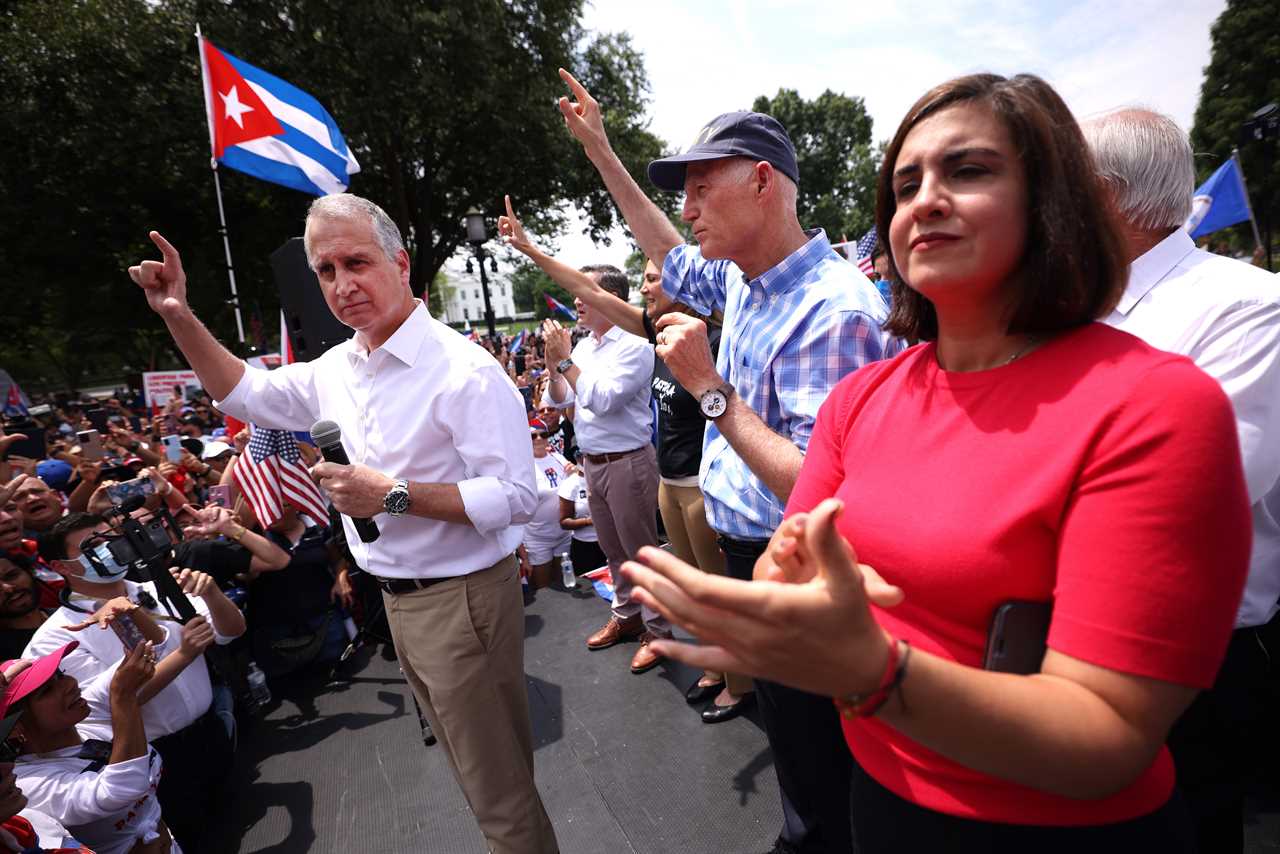
A large and diverse group of Latino candidates will be representing the Republican Party on the November ballot this year — forming a key piece of the party’s push to win more Latino voters.
House Republicans could be on track to increase their number of Latino members in 2023 by 50 percent — or more — after concerted recruitment efforts and a slew of summer primary wins by Hispanic and Latino candidates from Oregon to Texas to Virginia. The latest victory came Tuesday night in southern Arizona from Juan Ciscomani, a first-generation American who moved from Mexico to the U.S. as a child and worked on border and trade issues as a top adviser to GOP Gov. Doug Ducey.
Now, the party has landed Hispanic nominees in more than a half dozen battleground districts — and another three are well positioned to win their primaries over the next month. It’s a diversity push that takes on added significance because the GOP has recently begun aggressively courting Latino voters since Trump’s surprising surge in heavily Hispanic areas of the country in 2020.
"The Hispanic community has felt kind of in the middle, ignored," Ciscomani said. Democrats have taken them for granted, he noted, while Republicans have not often considered them to be persuadable voters.
"I will definitely not do either one of those," he continued. "I spoke to them yesterday in Spanish in my acceptance victory speech — a good portion of that was devoted in Spanish to let our community know that we're going to be reaching out."
Taken altogether, GOP recruiters are working to build a large bench of Latino candidates who will be well-positioned to both win over Hispanic voters becoming increasingly disillusioned with the Biden administration and also offer a unique perspective on policy issues once in office.
"I went through the process of immigrating. My career has been on trade and commerce cross-border, and border security is my No. 1 issue," Ciscomani said. "That's what I'm taking to Washington in November."
Besides Ciscomani, there are a slew of potential new members who could flip Democratic-held seats this fall.
The list includes Monica De La Cruz and Cassy Garcia, who are running for highly competitive two South Texas districts; Lori Chavez-DeRemer, a former mayor running for an open seat in Western Oregon; Yesli Vega, a Prince William County supervisor opposing Rep. Abigail Spanberger (D-Va.); and Michelle Garcia Holmes and Alexis Martinez Johnson, who are challenging two Democratic incumbents in New Mexico.
Congressional Republicans have long had a Latino presence from South Florida, where Cuban American voters have elected Cuban American Republicans to Congress. But this year's recruits span nearly every region of the country and range from Brazilian to Mexican to Guatemalan descent.

And the party already had an early success in June, when Republican Rep. Mayra Flores won an upset special election victory in South Texas, ending nearly a century of uninterrupted Democratic control of the region. Her win offered both a model and inspiration for other Latino candidates.
"I remember having on my first sign, it said: 'Familia first,'" Martinez Johnson recalled, worrying that some people in her New Mexico district would find the slogan unprofessional. "But then I saw Mayra Flores and she had it right there: Familia. Patria."
"It spoke to who she was and it spoke to the community."
The earliest signs of momentum appeared in 2020, when Latino candidates in Miami and West Texas rode a Trump-fueled surge to Congress. Reps. Carlos Gimenez (R-Fla.), María Elvira Salazar (R-Fla.) and Tony Gonzales (R-Texas) all won seats that swung hard to the right between 2016 and 2020.
Building off that momentum, House Republicans in May formed the Hispanic Leadership Trust, a PAC dedicated to electing more conservative Latino candidates. Led by Reps. Mario Diaz-Balart (R-Fla.) and Gonzales, the group aims to help mentor, recruit and raise money for candidates across the country.
It has the full backing of leadership, including House Minority Leader Kevin McCarthy.
"It's not just talk, you're seeing action," said Gonzales who traveled to Arizona this month to campaign for Ciscomani and Tanya Wheeless, a Latina candidate running in the Phoenix suburbs in a primary where votes are still being counted.
"It's always been, from both parties, they always show up two weeks before the election, say some broken Spanish and then get on the train and then get out of town," he said. "This is much different. This is us showing up early, showing up often, being authentic."
There are currently just a dozen Hispanic Republicans in the House, compared to 30 or so Democrats.
Nearly all of the current Hispanic GOP members are running again. And while a few will have tough races, the lead Rep. Jaime Herrera Beutler (R-Wash.) has staked out in her as-yet uncalled primary was a huge relief to her colleagues.
Some of the Latino candidates running in battlegrounds this year will have an easier path to Congress than others. Ciscomani, for example, is running in a district that is a true tossup.
Others, like the women in New Mexico, face longer odds in seats President Joe Biden won handily. They are also challenging incumbents who have far more campaign money to spend. Some GOP strategists, though, remain optimistic about Martinez Johnson's district in northern New Mexico, because it was redrawn to include the state's oil and gas industry and she is challenging Democratic Rep. Teresa Leger Fernandez, a supporter of a Green New Deal.
Martinez Johnson, an environmental engineer by trade, is trying to adopt a stance in the middle: "It's either you are pro-oil and gas, or you're all about sustainability. And in reality we have to merge the two," she said.
Operatives are feeling increasingly positive about an open seat in Oregon where the GOP nominee is Lori Chavez-DeRemer, the first Latina and female mayor of Happy Valley.
In an interview, Chavez-DeRemer said she saw her ability to connect with Hispanics as an asset in the race. The Hispanic population in Oregon is relatively small, but among the fastest growing demographics, she said.
Party leaders encouraged her to run and helped connect her with other Latino candidates. She said keeps in touch the women running in South Texas: "We text back and forth, everybody stays in contact so that we can motivate each other."
After 2020, she said it was clear the GOP saw her background and life experience as something desperately needed in their ranks.
"That balance of a woman, of a Hispanic woman, of a conservative, a business owner, a mayor, a mom, all those seem to be where the party was headed under this tent of diversity," Chavez-DeRemer said. "And we saw that last cycle, and now we'll compound that and add to it."
A few more Hispanic and Latino Republicans could secure primary wins in August and September, including George Logan, a former state senator challenging Rep. Jahana Hayes (D-Conn.); Anna Paulina Luna, a Trump-backed veteran running for an open seat in Florida; and George Santos, the son of Brazilian immigrants who is running for an open seat on Long Island.
Democrats, particularly in South Texas, have long warned that their party needs to step up its outreach with Latino voters, especially after Flores' win in the June special election. The Democratic Party is giving the GOP crucial inroads by taking Hispanic voters for granted, they said.
Several Republican Latino candidates running this election year said they or their family members used to be Democrats before the party drifted left. Recruiters claim the increase in Latino candidates is an outgrowth of that movement.
"We're offering candidates that actually not only look and sound like the district but are focused on the issues that matter most to them," said Rep. Tom Emmer, the chair of the House GOP campaign arm. "They believe in family, faith and freedom, and the opportunity this country offers. And they see our colleagues on the other side of the aisle killing the American dream."
----------------------------------------
By: Ally Mutnick
Title: A key ingredient to flip the House: A wave of Latino GOP candidates
Sourced From: www.politico.com/news/2022/08/04/gop-latino-candidates-00049736
Published Date: Thu, 04 Aug 2022 03:30:00 EST
Did you miss our previous article...
https://consumernewsnetwork.com/politics-us/how-ruth-bader-ginsburg-will-have-the-last-laugh-on-samuel-alito






